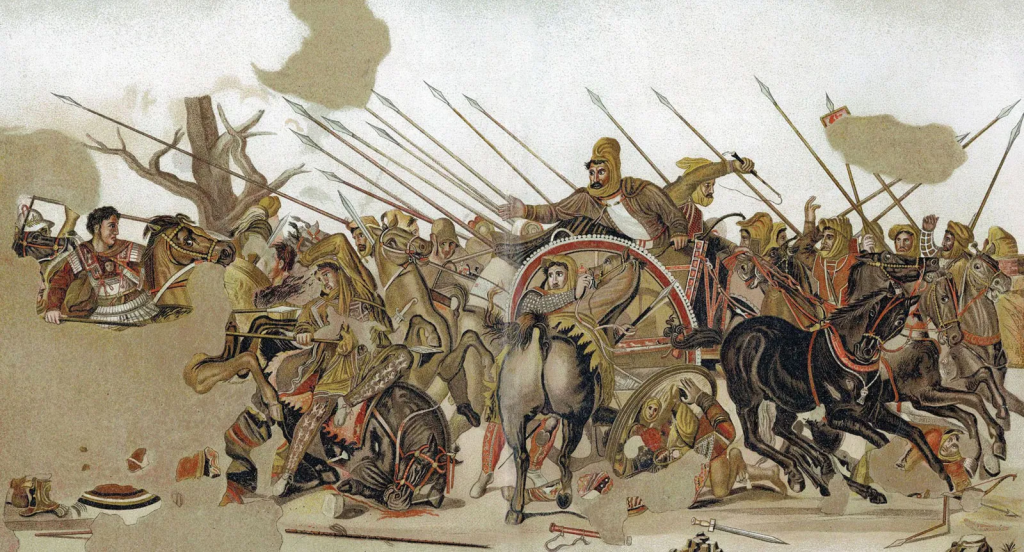The rivalry between Greece and Persia began in the 6th century BCE when the ever-expanding Persian Empire conquered Greek city-states in Asia Minor. The tension escalated after the Ionian Revolt and the famous Battle of Marathon. By 481 BCE, King Xerxes I of Persia launched the second Persian invasion of Greece, seeking to bring the entire Greek world under his control. Though ultimately repelled, his actions—including the burning of the Athenian Acropolis—left a deep scar on the Greek psyche. Even a century later, the call for revenge against Persia still echoed in Greek political circles. This resentment was cleverly harnessed by Philip II of Macedon and later his son, Alexander the Great.

Alexander’s Campaign Against Persia
In 334 BCE, Alexander set out on his legendary conquest under the pretext of avenging Greece and liberating the Greek cities of Asia Minor. With his father, Philip II, having been assassinated—possibly by Persian agents—Alexander had both personal and political motives for war. Leaving his mother, Olympias, to oversee affairs in Pella and Antipater to guard Macedonia with a modest force, Alexander embarked on his campaign with around 30,000–40,000 infantry and 4,000–5,000 cavalry. Despite being weighed down by his father’s debts and carrying only a month’s worth of supplies, he crossed the Hellespont (modern-day Dardanelles) with an audacious dream.
Before engaging in battle, Alexander made a symbolic pilgrimage to Troy, paying homage to his hero, Achilles. Accompanied by his lifelong friend Hephaestion, he honored the warriors of the Iliad—Alexander at the tomb of Achilles, and Hephaestion at that of Patroclus. With this act, he aligned himself with the legendary Greek warriors of old, further motivating his troops for the upcoming battles.
The Battle of the Granicus River (334 BCE)
The first major clash occurred at the Granicus River, where three Persian satraps (governors) and their Greek mercenary forces, numbering around 40,000, awaited him. A Greek mercenary leader, Memnon of Rhodes, advised the Persians to scorch the land, starving Alexander’s army. However, the Persian satraps refused to sacrifice their wealth, a decision that would cost them dearly.
Alexander led the charge himself, commanding his elite Companion Cavalry. Amidst the chaos, two Persian satraps fell by his hand, and at one point, his helmet was nearly cleaved off by an enemy axe. He was only saved from a fatal blow by his general, Cleitus the Black. The Persian forces crumbled under the relentless Macedonian assault. To send a chilling message, Alexander executed most of the Greek mercenaries fighting for Persia and enslaved the rest, shipping them back to Macedonia for forced labor. As a final insult, he sent 300 Persian suits of armor to Athens as a dedication to Athena, inscribed: “From Alexander, son of Philip, and the Greeks (except the Spartans), taken from the barbarians of Asia.”
Why Did Alexander Win?
Despite being outnumbered, Alexander’s victory was decisive, thanks to three key factors:
- A Superior Army: Philip II had transformed the Macedonian army into a professional force, superior in training and discipline to the Persian troops.
- Brilliant Leadership: Alexander was not just a king but a military genius, capable of rapid tactical decisions and inspiring leadership.
- Personal Courage: Unlike many rulers who commanded from behind, Alexander fought alongside his men, sharing their risks. This unwavering bravery won the trust and loyalty of his soldiers, keeping their morale high even in dire situations.
Legacy and Cultural Impact
Alexander’s campaign against Persia was not just a military conquest; it was a cultural shift. His victories marked the beginning of the Hellenistic era, blending Greek and Persian traditions. His vision of a united world—though never fully realized—left a lasting impact on history. Today, his battles are studied in military academies, and his leadership style remains an inspiration. The clash between Greece and Persia was more than just war; it was the birth of a new cultural fusion that shaped civilizations for centuries.

No comments yet.